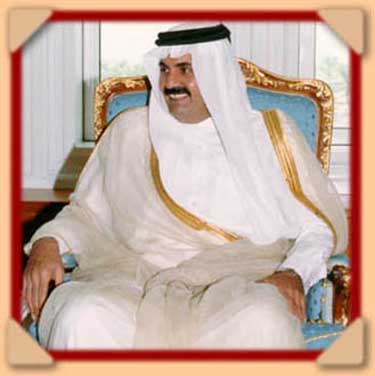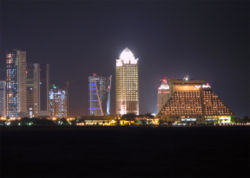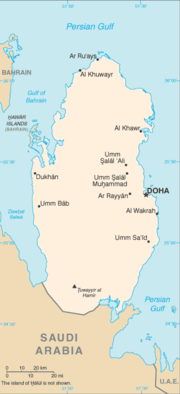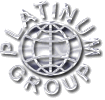| |
The
State of Qatar
|
| Land
and People
The Qatari peninsula juts 100 miles (161 km) north
into the Persian Gulf from Saudi Arabia and is slightly smaller
than Connecticut. Much of the country consists of a low, barren
plain, covered with sand. To the southeast lies the spectacular
Khor al Adaid (“Inland Sea”), an area of rolling
sand dunes surrounding an inlet of the Gulf. There are mild
winters and very hot, humid summers.
Nearly all Qataris profess Islam. Besides ethnic Arabs, much
of the population migrated from various nations to work in
the country’s oil industry. Arabic serves as the official
language. However, English as well as many other languages
are spoken.
Expatriates
form the majority of Qatar’s residents. The petrochemical
industry has attracted people from all around the world. Most
of the expatriates come from South Asia and from non-oil-rich
Arab states. Because a large percentage of the expatriates
are male, Qatar has a heavily skewed sex ratio, with 1.8528
males per female.[5]
In
July 2007, the country had a growing population of approximately
907,229 people[5], of whom approximately 350,000 were believed
to be citizens.[8] Of the citizen population, Sunni Muslims
form a majority, while the Shi'a Muslims count up to 10-13%
of the population. The Wahhabi Muslims form the third group
in size, probably no more than 10% of the population, to include
the ruling dynasty and a large number of the elite families.
The ancient Shia community of Qatar are historically related
to the Shia majority in Bahrain and the al-Hasa coastal province
of Saudi Arabia, while the Wahhabis arrived from Najd only
in the 19th century. |

Sheikh Hamad bin Khalifa Al-Thani |
Government
When contrasted with other Arab states such as Saudi
Arabia, for instance, Qatar has comparatively liberal laws,
but is still not as liberal as some of its neighbours like
UAE or Bahrain. Qatar is a civil law jurisdiction. However,
Shari'a or Islamic law is applied to aspects of family law,
inheritance and certain criminal acts. Women can legally drive
in Qatar, whereas they may not in Saudi Arabia and there is
a strong emphasis in equality and human rights brought by
the HRA.
The country
has undergone a period of liberalization and modernisation
during the reign of the current Emir, Hamad bin Khalifa Al-Thani,
who came to power in 1995. Under his rule, Qatar became the
first Arab country in the Persian Gulf where women gained
the right to vote [16] as well as holding senior positions
in government. Also, women can dress mostly as they please
in public (although in practice local Qatari women generally
don the black abaya). Before the liberalisation, it was taboo
for men to wear shorts in public. The laws of Qatar tolerate
alcohol to a certain extent. However, public bars and nightclubs
in Qatar operate only in expensive hotels and clubs, much
like in the UAE, though the number of establishments has yet
to equal that of UAE. Non-Muslim expatriates resident in Qatar
are eligible to receive liquor permits permitting them to
purchase alcohol for personal use through Qatar Distribution
Company, the exclusive importer and retailer for alcohol in
Qatar. Qatar has further been liberalised due to the 15th
Asian Games, but is cautious of becoming too liberal in their
law. Overall Qatar has yet to reach the more western laws
of UAE or Bahrain, and though plans are being made for more
development, the government is cautious. |
|
Economy
Before
the discovery of oil, the economy of the Qatari region focused
on fishing and pearling. After the introduction of the Japanese
cultured pearl onto the world market in the 1920s and 1930s,
Qatar's pearling industry faltered. However, the discovery
of oil, beginning in the 1940s, completely transformed the
state's economy. Now the country has a high standard of living,
with many social services offered to its citizens and all
the amenities of any modern state.
Qatar’s
national income primarily derives from oil and natural gas
exports. The country has oil estimated at 15 billion barrels
(2.4 km³), while gas reserves in the giant north field
(South Pars for Iran) which straddles the border with Iran
and are almost as large as the peninsula itself are estimated
to be between 800 trillion cubic feet (23,000 km3) to 80 trillion
cubic feet (2,300 km3) (1 trillion cubic foot is equivalent
to about 80 million barrels (13,000,000 m3) of oil). Qatar
is sometimes referred to as the Saudi Arabia of natural gas.
Qataris’ wealth and standard of living compare well
with those of Western European states; Qatar has the highest
GDP per capita in the Arab World according to the International
Monetary Fund (2006) [4] and the highest GDP per capita in
the world according to the CIA (2007),[5] though it was previously
the United Arab Emirates that was the wealthiest Arab country
according to the University of Pennsylvania (2003).[6] With
no income tax, Qatar is also one of the two least-taxed sovereign
states in the world (the other is Bahrain). |
|
 |
 |
 |

|
| |
|
|
|
|

